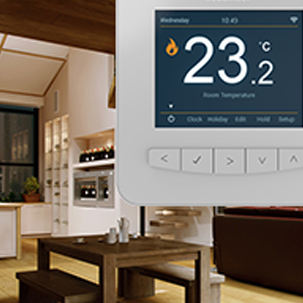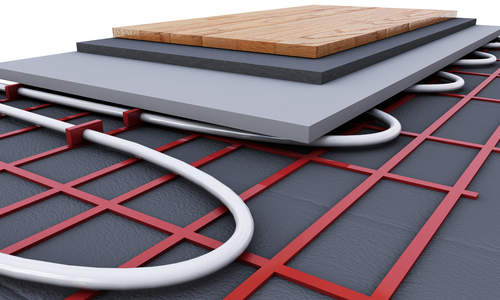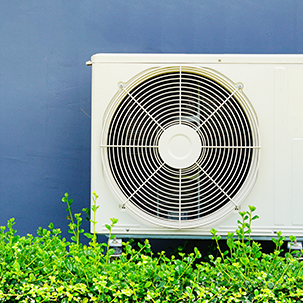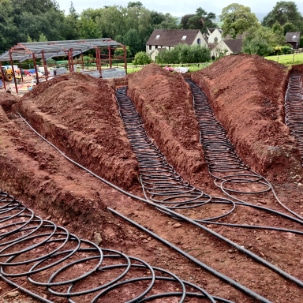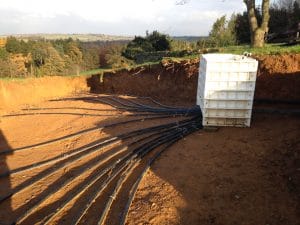
A Ground Source heat pump works by sustainably extracting energy stored in the top strata underground. This energy is provided from both the sun and stored in groundwater. To extract this energy pipe is laid horizontally 1m underground and filled with a water/antifreeze mix. A pump circulates this fluid which it takes on heat from the surrounding soil before returning back to the heat pump. This energy is transferred gas refrigerant circuit before being turned into usable high grade heat by a compressor.
A well installed Ground Source Heat Pump should have an average COP across the year of 4:1. Therefore for every kWh of electricity consumed by the heat pump, 4kWh’s of heat will be produced. With an average unit of electricity cost of 13p/kWh this will lead to an average running cost of 3.25p/kWh. This is by far the cheapest heating source available in the UK currently, with mains gas at 4.5p/kWh and oil or LPG at 7-8p/kWh. The capital costs of its installation are higher than a conventional fossil fuel source. The domestic RHI tariff now means that a ground source system will be paid off in between 4-6 years (depending on collector array type needed), not taking into account the savings made versus your existing fuel source. The RHI is discussed in more detail further down the page.
Key design features:
The design of the collector array is key to the sustainability of the system. It is your fuel source. It is vital that sufficient pipe is buried underground and spread over a large enough area to ensure that over time ground temperatures will not continue to drop where energy is extracted in greater quantities than it is replaced. A poorly installed system leaves either the flow coming back from the ground very cold (meaning the groundloops are undersized and too much energy is being extracted from too small an area – the system is not sustainable) and/or the flow temperature going out to the heating system needing to be very high as the radiators are undersized. Either way (or both) leaves the compressor a lot of work to do, meaning more electricity is needed – the system is less efficient.You will need between 1/2 to 1 acre of open ground to install the collector.
Our groundworks packs that are supplied optionally with our heat pump systems are sized to cope with most conditions based off MCS guidelines, it is only in exceptionally porous sand or gravel where no groundwater will be retained will a small quantity of additional pipe will be required.
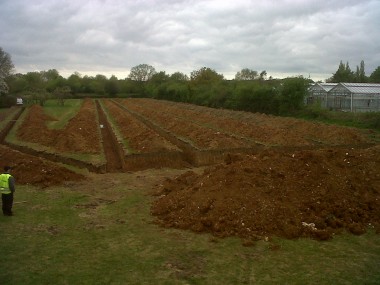
There clearly is a capital cost associated with the purchase, excavation and burying of the ground loops which is over that of air source heat pumps, however if this work can be tied in with other aspects of the build then these costs can be kept to a minimum. A fair price for a man and a machine is around £5 per linear metre of trench, increasing to over £10 per metre if you use a professional groundworks outfit.
The RHI grant is currently available for Ground Source Heat Pumps in both domestic and commercial situations to offset the cost of installations. It is only available for an end user, not a speculative developer. The Domestic grant, available for 7 years is set at 18.8p per kWh produced. This is a deemed figure, and is calculated based on the naturally sourced energy your property will require per year as stated in your Energy Performance Certificate. In order to be eligible you will have to have your system commissioned by an MCS installer (to produce an MCS certificate) and provide a recent EPC certificate number. If the property is a retrofit you will also (currently) need a green deal assessment conducted on the property. The Commercial grant is available for 20years at a rate of 8.7p/kWh initially, dropping to 2.6p/kWh after the first 1314 run hours of operation. This requires metering of the heat pumps output and involves a slightly different application process. All of Spire Renewables equipment would be accepted via the ‘simple’ application process, unless a portion of the heat produced by the system was for an ineligible use such as an outdoor swimming pool.
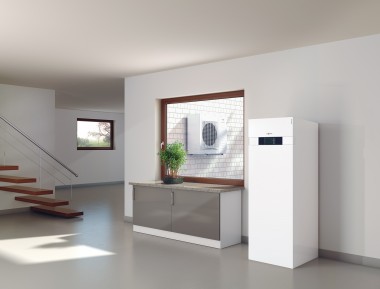
An Air Source heat pump works with the same principle as a ground source heat pump. Rather than pumping fluid around a series of pipes underground, a fan set outside pulls air across a heat exchanger set outside. This airflow warms the extremely cold refridgerant on the opposite side of the heat exchanger before heading into the compressor to be turned into high grade heat. As the air passes across the heat exchanger approximately 5oC is extracted. Therefore once ambient temperature drops to below 5oC, then any moisture in the air will freeze to the plate heat exchanger as energy is extracted. Therefore when you most need heat, the heat pump has to spend at least some of its time defrosting (so drawing energy rather than producing it!).
A well designed Air source system should have a average Coefficient of performance of 3:1 across the year- This means that for every 3kWh of heat output from the heat pump it takes 1kWh of electricity to run the compressor. At an average electricity purchase cost of 12p/kWh that therefore means that it costs on average approximately 4p/kWh to run an air source heat pump.
This lower efficiency in comparison to ground source systems is for two reasons. Firstly its temperature source (ambient air) is often slightly cooler during the heating season than ground temperature. Secondly it is also due to the high moisture content of air in the UK air source meaning units have to spend a lot of time defrosting to prevent ice build up on the heat exchanger.Air source heat pumps however have a significantly reduced capital cost to install in comparison to a ground source heat pump, as there are no significant groundworks required.
The key design points for an efficient air source heat pump are one that has a large plate heat exchanger and an efficient defrost cycle, located in as warm a location as possible. From our experience and testing looking to cheaper mass market units (Daikin, Mitsubishi etc.) these simply do not deliver the efficiencies described. Cheaper units have been seen to have COPs of less than 2, either through poor unit design or installation. It really does pay to spend a little more on your capital plant in the air source industry in our experience, in order to get an efficiency that warrants a decent installation.
Air Source Heat Pumps however will however operate significantly more efficiently than ground source heat pumps during the summer months. If left to heat an outdoor pool for example, an air source unit will record average COP’s of over 5:1. This is because the unit does not have to de-frost and it can readily extract energy from the higher available air temperatures.
The RHI grant is currently available for Air Source Heat Pumps in both domestic and commercial situations to offset the cost of installations. It is only available for an end user, not a speculative developer. The Domestic grant, available for 7 years is set at 7.3p per kWh produced. This is a deemed figure, and is calculated based on the naturally sourced energy your property will require per year as stated in your Energy Performance Certificate. In order to be eligible you will have to have your system commissioned by an MCS installer (to produce an MCS certificate) and provide a recent EPC certificate number. If the property is a retrofit you will also (currently) need a green deal assessment conducted on the property. The Commercial grant is available for 20years at a lower rate of 2.5p/kWh but does nearly cover the cost of running the heat pump, leaving you with nearly free heating for twenty years. This requires metering of the heat pumps output and involves a slightly different application process. All of Spire Renewables equipment would be accepted via the ‘simple’ application process, unless a portion of the heat produced by the system was for an ineligible use such as an outdoor swimming pool.



